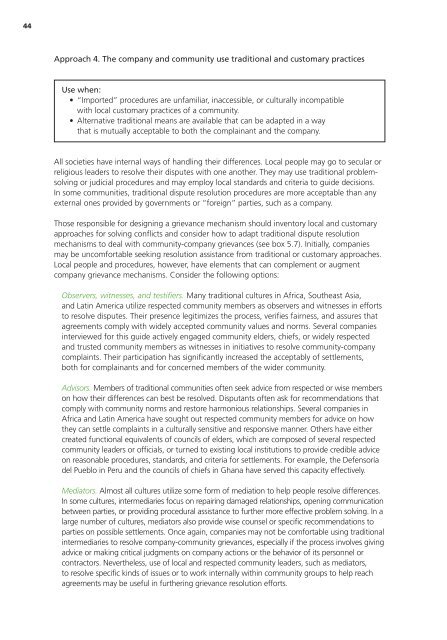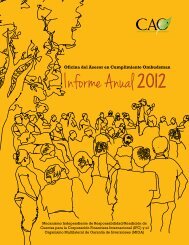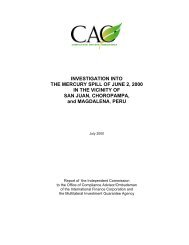A Guide to Designing and Implementing Grievance Mechanisms for ...
A Guide to Designing and Implementing Grievance Mechanisms for ...
A Guide to Designing and Implementing Grievance Mechanisms for ...
Create successful ePaper yourself
Turn your PDF publications into a flip-book with our unique Google optimized e-Paper software.
44<br />
Approach 4. The company <strong>and</strong> community use traditional <strong>and</strong> cus<strong>to</strong>mary practices<br />
Use when:<br />
• “Imported” procedures are unfamiliar, inaccessible, or culturally incompatible<br />
with local cus<strong>to</strong>mary practices of a community.<br />
• Alternative traditional means are available that can be adapted in a way<br />
that is mutually acceptable <strong>to</strong> both the complainant <strong>and</strong> the company.<br />
All societies have internal ways of h<strong>and</strong>ling their differences. Local people may go <strong>to</strong> secular or<br />
religious leaders <strong>to</strong> resolve their disputes with one another. They may use traditional problemsolving<br />
or judicial procedures <strong>and</strong> may employ local st<strong>and</strong>ards <strong>and</strong> criteria <strong>to</strong> guide decisions.<br />
In some communities, traditional dispute resolution procedures are more acceptable than any<br />
external ones provided by governments or “<strong>for</strong>eign” parties, such as a company.<br />
Those responsible <strong>for</strong> designing a grievance mechanism should inven<strong>to</strong>ry local <strong>and</strong> cus<strong>to</strong>mary<br />
approaches <strong>for</strong> solving conflicts <strong>and</strong> consider how <strong>to</strong> adapt traditional dispute resolution<br />
mechanisms <strong>to</strong> deal with community-company grievances (see box 5.7). Initially, companies<br />
may be uncom<strong>for</strong>table seeking resolution assistance from traditional or cus<strong>to</strong>mary approaches.<br />
Local people <strong>and</strong> procedures, however, have elements that can complement or augment<br />
company grievance mechanisms. Consider the following options:<br />
Observers, witnesses, <strong>and</strong> testifiers. Many traditional cultures in Africa, Southeast Asia,<br />
<strong>and</strong> Latin America utilize respected community members as observers <strong>and</strong> witnesses in ef<strong>for</strong>ts<br />
<strong>to</strong> resolve disputes. Their presence legitimizes the process, verifies fairness, <strong>and</strong> assures that<br />
agreements comply with widely accepted community values <strong>and</strong> norms. Several companies<br />
interviewed <strong>for</strong> this guide actively engaged community elders, chiefs, or widely respected<br />
<strong>and</strong> trusted community members as witnesses in initiatives <strong>to</strong> resolve community-company<br />
complaints. Their participation has significantly increased the acceptably of settlements,<br />
both <strong>for</strong> complainants <strong>and</strong> <strong>for</strong> concerned members of the wider community.<br />
Advisors. Members of traditional communities often seek advice from respected or wise members<br />
on how their differences can best be resolved. Disputants often ask <strong>for</strong> recommendations that<br />
comply with community norms <strong>and</strong> res<strong>to</strong>re harmonious relationships. Several companies in<br />
Africa <strong>and</strong> Latin America have sought out respected community members <strong>for</strong> advice on how<br />
they can settle complaints in a culturally sensitive <strong>and</strong> responsive manner. Others have either<br />
created functional equivalents of councils of elders, which are composed of several respected<br />
community leaders or officials, or turned <strong>to</strong> existing local institutions <strong>to</strong> provide credible advice<br />
on reasonable procedures, st<strong>and</strong>ards, <strong>and</strong> criteria <strong>for</strong> settlements. For example, the Defensoría<br />
del Pueblo in Peru <strong>and</strong> the councils of chiefs in Ghana have served this capacity effectively.<br />
Media<strong>to</strong>rs. Almost all cultures utilize some <strong>for</strong>m of mediation <strong>to</strong> help people resolve differences.<br />
In some cultures, intermediaries focus on repairing damaged relationships, opening communication<br />
between parties, or providing procedural assistance <strong>to</strong> further more effective problem solving. In a<br />
large number of cultures, media<strong>to</strong>rs also provide wise counsel or specific recommendations <strong>to</strong><br />
parties on possible settlements. Once again, companies may not be com<strong>for</strong>table using traditional<br />
intermediaries <strong>to</strong> resolve company-community grievances, especially if the process involves giving<br />
advice or making critical judgments on company actions or the behavior of its personnel or<br />
contrac<strong>to</strong>rs. Nevertheless, use of local <strong>and</strong> respected community leaders, such as media<strong>to</strong>rs,<br />
<strong>to</strong> resolve specific kinds of issues or <strong>to</strong> work internally within community groups <strong>to</strong> help reach<br />
agreements may be useful in furthering grievance resolution ef<strong>for</strong>ts.





